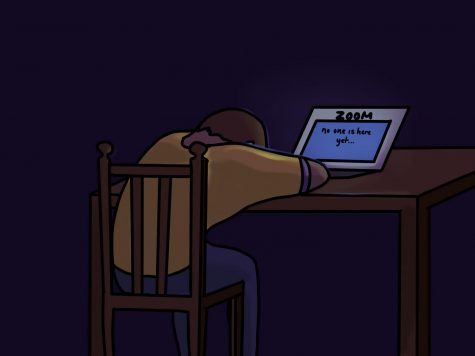Just OK: Our lukewarm experience with IWS
March 17, 2021

When I, Sophie, first reached out to Integrative Wellbeing Services (IWS) in March 2020, I had no idea that a global pandemic was brewing. Over email, I scheduled an intake session and planned to meet with a therapist, expressing my lack of experience with therapy and hoping for an introduction to the process. We were sent home before I could attend the session, and I received an email some time later promising “two 30-minute transition planning sessions” to help construct an individual plan for care during the transition to remote learning. This turned into a hurried five-minute exchange in which it was suggested that I try Talkspace, an online therapy service provided through the College. I did, but soon decided that it was not the right format for me. Talkspace’s method of finding therapeutic matches felt very one-size-fits-all, and there was no way of knowing whether or not a therapist was equipped to discuss complex (and often controversial) issues like gender identity. Thus, I was left to try to figure things out on my own — something that I had reached out for support with because I was already in crisis mode.
As for me, Caleb, I started therapy in high school and found it helpful to talk weekly with someone, regardless of what was going on in my life. It seemed natural to seek out something similar at Williams, so in fall 2019, I navigated the IWS intake process and started meeting weekly with a therapist here. Soon, however, these weekly sessions were slashed in length: I spent as much time walking from Mission to Pond House and back as actually inside. When the pandemic hit, I, like Sophie, was granted two transition sessions that amounted to a Talkspace referral, and I haven’t seen my Williams-contracted therapist since. Wary of a startup that has been accused of data-mining its confidential therapy transcripts, I felt that Talkspace was not the right solution for me either.
We both acknowledge that Talkspace does seem to work for some people and was well-suited to be a short-term solution. In March, it made sense for IWS to rely on Talkspace to get around state licensure laws, which limit the area in which a therapist can practice and thus restrict the range of teletherapy services. However, we are disappointed that, in the following 12 months, the extent of mental health services available through IWS has not grown in proportion to student need.
As it currently stands, therapy access through IWS is confusing and limited. Since therapy sessions are limited to on-campus students once every other week, it’s only possible to see your therapist seven or eight times total this semester, and that’s if you started intake weeks ago. When sessions were reduced in length and frequency last year, Director of IWS Wendy Adam recommended “filling the gap” between short, infrequent sessions by accessing other IWS services. This might be appropriate if therapy sessions were fungible, but therapy works much better when focused on a close, trusting relationship with your therapist. It is nearly impossible to build such a relationship in the face of these limitations, and additional IWS programming doesn’t help with that. Remote students (who are disproportionately on financial aid) have it worse: If Talkspace doesn’t work for them, they are left without alternatives.
While we applaud efforts to think outside the box of traditional therapy, such as the workshops that were offered in January, these groups tend to serve a different purpose from therapy, as they lack long-term, individualized attention, and are sometimes inconveniently scheduled. Williams has made student mental health an institutional priority, and we believe that to accomplish that goal, more resources should go towards providing students, especially remote students, with reliable access to traditional teletherapy.
Our experience was not exactly bad — it was just lukewarm. And for us, a lukewarm response was disheartening. Reflecting on this experience, we would like to see IWS step up and focus on making their department accessible and interactive regardless of students’ experience and comfort with traditional therapy services, so that students do not have to fight an uphill battle to be heard.
Sophie Throop ’23 is from Oswego, N.Y. Caleb Dittmar ’23 is from Menlo Park, Calif.








